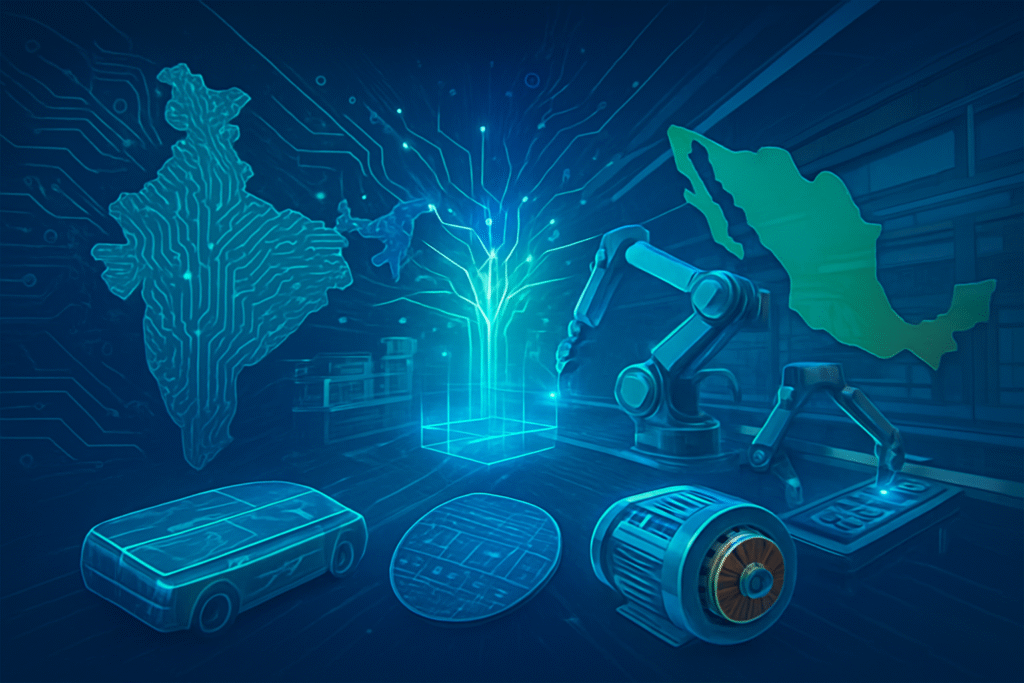
Aguascalientes, a strategically positioned state in Mexico, is rapidly becoming a pivotal nexus for technology transfer and investment from India, signaling a burgeoning era of cross-border collaboration in advanced manufacturing and emerging technologies. This proactive engagement, driven by a global nearshoring trend and mutual economic interests, aims to integrate Indian technological prowess into North American value chains, particularly in sectors critical to the future of industry and artificial intelligence. The deepening ties signify a concerted effort to foster innovation, create high-value jobs, and establish Aguascalientes as a leading hub for sophisticated technological development and production.
The collaboration extends beyond traditional trade, focusing on the intricate transfer of technological know-how, joint development projects, and significant foreign direct investment. This strategic alliance is poised to redefine the industrial landscape of Aguascalientes, diversifying its economic base and bolstering its capacity for cutting-edge research and development. For India, it offers a crucial gateway to the North American market, leveraging Mexico's geographical advantage and established manufacturing infrastructure.
A New Frontier of Technical Collaboration and Investment
The past year has seen an aggressive push to solidify these ties, marked by high-level diplomatic missions and substantial investment announcements. In November 2025, Aguascalientes Governor Tere Jiménez led a business mission to India, engaging with automotive, agricultural, and industrial giants like RANE, LUCAS TVS, TAFE, and Simpson. The mission underscored the state's ambition to become a critical link in North American supply chains.
Concrete investments are already materializing, showcasing the tangible outcomes of this collaboration. In September 2025, Indian tractor manufacturer Tractors and Farm Equipment Limited (TAFE) inaugurated a new assembly plant in Aguascalientes, backed by an investment of MX$280 million (approximately US$15.5 million). This facility is set to produce electric tractors, aligning with Mexico's sustainable mobility goals and creating 250 jobs. Prior to this, in March 2024, Brakes India, a major producer of braking systems and iron components, announced a US$70 million investment for a new smelting plant, expected to generate 700 jobs and marking its first foray into Mexico. Earlier, in October 2018, Indian multinational Tech Mahindra (NSE: TECHM) expanded its footprint in Aguascalientes with a US$5 million investment in a second facility, providing technology services across diverse industries and aiming to create around 300 jobs. These investments signify a clear shift towards advanced manufacturing processes, electric vehicle component production, and sophisticated IT service delivery, differentiating them from traditional, lower-tech manufacturing by embedding higher levels of automation, precision, and digital integration. Initial reactions from the local industrial community and tech experts have been overwhelmingly positive, citing the potential for skill upgrading and technological leapfrogging.
Beyond direct investments, broader bilateral agreements are creating a fertile ground for deeper tech collaboration. A significant technology collaboration agreement was signed between Mexico and India in March 2023, committing US$500,000 each to an accelerator fund for binational development and innovation projects. These projects span critical areas such as water management, low-cost vaccine production, lithium extraction, aerospace, and biotechnology. Furthermore, high-level discussions between Prime Minister Narendra Modi and Mexico's President Claudia Sheinbaum in late 2023/early 2024 have explored cooperation in cutting-edge fields like semiconductors, Artificial Intelligence (AI), Quantum computing, and critical minerals, leveraging Mexico's nearshoring potential to strengthen manufacturing and pharmaceutical supply chains. This comprehensive approach ensures that the collaboration addresses both immediate industrial needs and long-term strategic technological advancements.
Competitive Implications for the AI and Tech Landscape
The burgeoning partnership between Aguascalientes and India holds significant competitive implications for AI companies, tech giants, and startups across both regions and North America. Companies like TAFE and Brakes India are gaining a strategic foothold in the North American market, enabling them to bypass some supply chain complexities and tariff issues by producing closer to their end consumers. This "nearshoring" strategy offers a competitive edge, reducing lead times and increasing responsiveness to market demands for automotive components and agricultural machinery.
For global tech giants and AI labs, Aguascalientes' proactive stance, coupled with Indian tech investments, enhances its appeal as a potential R&D and manufacturing hub. The state's focus on attracting investment in semiconductors, AI, and Quantum technologies positions it to become a key player in these high-growth sectors. This could lead to increased competition for talent and resources in the region, but also foster a more dynamic and innovative ecosystem. Startups in Aguascalientes, particularly those in advanced manufacturing, IT, and green technologies, stand to benefit from the influx of foreign capital, technological expertise, and potential partnerships with established Indian firms. The presence of companies like Tech Mahindra (NSE: TECHM) also provides opportunities for local talent development and exposure to global best practices in IT services and digital transformation.
The potential disruption to existing products and services lies in the introduction of more technologically advanced and cost-efficient solutions. For instance, TAFE's electric tractor production could accelerate the adoption of sustainable agricultural practices, challenging traditional fossil fuel-dependent machinery. Similarly, enhanced manufacturing capabilities, driven by Indian investment, could lead to more competitive pricing and higher quality components for the North American automotive industry. Aguascalientes' strategic advantage is its commitment to developing a skilled workforce, particularly in STEM fields, and creating a favorable business environment. This market positioning could draw further investment away from other regions, intensifying competition among states and countries vying for foreign direct investment in advanced technology sectors.
Wider Significance in the Global AI Landscape
This cross-border collaboration between Aguascalientes and India fits squarely into broader global AI and technology trends, particularly the increasing emphasis on diversified supply chains, regional manufacturing hubs, and the strategic importance of emerging technologies. The nearshoring phenomenon, accelerated by geopolitical shifts and recent supply chain disruptions, is a major driver, with Mexico offering a stable and geographically advantageous alternative for companies aiming to serve the North American market. This partnership exemplifies a growing trend where developing economies are not just recipients of technology but active participants in its transfer and co-creation.
The impacts are multi-faceted. Economically, these investments are injecting significant capital into Aguascalientes, creating high-value jobs, and diversifying its industrial base beyond traditional sectors. Technologically, the transfer of expertise in areas like electric vehicle manufacturing, advanced IT services, and potentially semiconductors and AI, elevates the state's technological capabilities. Socially, the focus on academic cooperation and workforce development is crucial for human capital development, ensuring a skilled labor force capable of sustaining and advancing these technological initiatives.
Potential concerns might include the equitable distribution of benefits, ensuring that local small and medium-sized enterprises (SMEs) are integrated into these new supply chains, and managing the environmental impact of increased industrial activity. However, the explicit focus on sustainable technologies like electric tractors suggests a proactive approach to environmental considerations. This collaboration can be compared to previous AI milestones and breakthroughs where international partnerships were crucial for accelerating development and adoption. For instance, the global collaboration in semiconductor manufacturing or aerospace technology has historically demonstrated the power of shared resources and expertise. The current initiative in Aguascalientes, particularly its focus on AI-related manufacturing and digital services, positions it as a key player in the next wave of industrial transformation driven by intelligent automation and data.
Exploring Future Developments and Horizons
The trajectory of the Aguascalientes-India tech collaboration points towards several exciting near-term and long-term developments. In the near term, we can expect continued growth in foreign direct investment from India, particularly in the automotive components sector, as more companies seek to establish a North American presence. The focus on electric vehicle components and advanced manufacturing will likely intensify, further cementing Aguascalientes' role in the sustainable mobility ecosystem. The academic partnerships, including student exchanges and technology-focused education, are expected to bear fruit, producing a highly skilled workforce tailored to the demands of Industry 4.0 and AI-driven industries.
Looking further ahead, the explicit mention of cooperation in semiconductors, AI, and Quantum technologies in national-level agreements suggests a strategic pivot towards high-tech R&D and manufacturing. Aguascalientes is actively positioning itself as a leader in semiconductor supply chains, which could lead to significant investments in chip design, fabrication, or packaging facilities. Potential applications and use cases on the horizon include the development of AI-powered manufacturing processes, smart city solutions, and advanced agricultural technologies leveraging IoT and machine learning. The region could become a testing ground for integrated AI solutions in industrial settings, from predictive maintenance in factories to optimized logistics and supply chain management.
However, challenges remain. Ensuring a continuous supply of highly specialized talent, developing robust digital infrastructure to support advanced AI applications, and navigating complex international intellectual property frameworks will be critical. Experts predict that the success of this collaboration will depend on sustained political will, continued investment in education and infrastructure, and the ability to foster a truly innovative ecosystem that encourages both foreign and domestic tech companies. The next steps will likely involve more detailed feasibility studies for high-tech ventures and the establishment of dedicated innovation centers.
A Comprehensive Wrap-Up of a Strategic Alliance
The strategic alliance between Aguascalientes and India represents a significant chapter in the ongoing narrative of global technological integration and economic diversification. Key takeaways include the successful leveraging of the nearshoring trend, the substantial influx of Indian investment into advanced manufacturing and IT services, and the proactive development of human capital through academic partnerships. This collaboration is not merely about attracting capital but about fostering a deeper exchange of technology and expertise, positioning Aguascalientes as a dynamic hub within the North American supply chain for critical and emerging technologies.
This development's significance in AI history lies in its demonstration of how regional governments can strategically position themselves to attract and integrate advanced technological capabilities from international partners. It underscores the global nature of AI development and deployment, moving beyond traditional tech hubs to new geographical centers of innovation. The focus on AI, semiconductors, and Quantum computing, though still nascent in its direct investment, lays the groundwork for Aguascalientes to play a crucial role in the future of intelligent systems and advanced manufacturing.
In the long term, this partnership has the potential to transform Aguascalientes into a robust ecosystem for technological innovation, attracting further investment and talent, and serving as a model for other regions seeking to capitalize on global shifts in manufacturing and technology. What to watch for in the coming weeks and months includes further announcements of investment, particularly in the high-tech sectors identified, and the concrete implementation of academic exchange programs aimed at developing the next generation of AI and tech professionals. The sustained momentum of these initiatives will be critical in realizing the full potential of this strategic cross-border collaboration.
This content is intended for informational purposes only and represents analysis of current AI developments.
TokenRing AI delivers enterprise-grade solutions for multi-agent AI workflow orchestration, AI-powered development tools, and seamless remote collaboration platforms.
For more information, visit https://www.tokenring.ai/.





